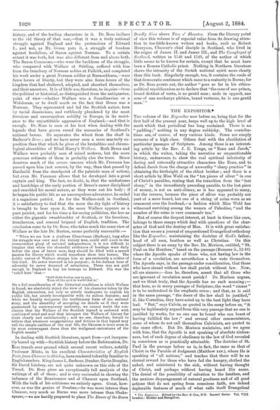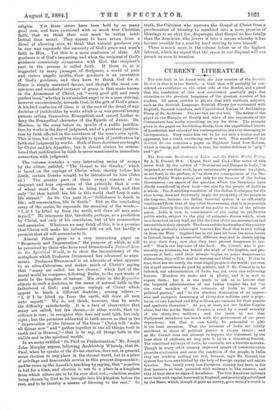THE EXPOSITOR.* THE volume of the Expositor now before us,
being that for the first half of the present year, keeps well up to the high level of merit which that periodical has long sustained. There is no " padding ;" nothing in any degree rubbishy. The contribu- tions are, of course, of very various kinds. Some are simply sermons of a high class. Others deal with the elucidation of particular passages of Scripture. Among these is an interest- ing article by the Rev. J. E. Yonge, on "Esau and Jacob," in which the writer, taking the narrative as unquestionable history, endeavours to show the real spiritual inferiority of daring and externally attractive characters like Esau, and to defend Jacob from the charge of unworthy "sharp practice" in obtaining the birthright of the eldest brother ; and there is a short article by Miss Weld on the "ten pieces of silver" in one of Christ's parables, stating that the transition from the "lost sheep," in the immediately preceding parable, to the lost piece of money, is not an anti-climax, as it has appeared to many, but the reverse, because the piece of silver was probably not part of a mere hoard, but one of a string of coins worn as an ornament over the forehead,—a fashion which Miss Weld has witnessed surviving among the women of Palestine, "and the number of the coins is very commonly ten."
But of course the deepest interest, at least in times like ours, belongs to those essays which deal with questions of the char- acter of God and the destiny of Man. It is with great satisfac- tion that we see a journal of unquestioned Evangelical orthodoxy like the Expositor, maintaining the doctrine of God's father- hood of all men, heathen as well as Christian. On this subject there is an essay by the Rev. Dr. Morison, entitled, "St. Paul on the Heathen," based on the passage (Romans ii., 12-16) where the Apostle speaks of those who, not having law in the- form of a revelation, are nevertheless a law unto themselves. The Apostle says, in the passage under consideration, that those who have sinned without law shall perish without law. Now, all are sinners ;—does he, therefore, assert that all those who are ignorant of revelation must perish ? Dr. Morison argues, and we think truly, that the Apostle has no such meaning ;— that here, as in many passages of Scripture, the word "sinner is to be understood in the emphatic sense ; and that, as is said in the same passage, "the doers of the law shall be justified,' if, like Cornelius, they have acted up to the best light they have had. "But," says Calvin, as quoted in the essay before us, "it may be legitimately argued from this very passage that no one is justified by works, for no one can be found who can boast of having fulfilled the law ;" and several other commentators, some of whom do not call themselves Calvinists, are quoted to the same effect. But Dr. Morison maintains, and we agree with him, that the Apostle is not speaking of absolute sinless- ness, but of such degree of obedience to the law of God revealed in conscience as is practically attainable. The doctrine of St. Paul in the passage before us is, in fact, the same as that of Christ in the Parable of Judgment (Matthew xxv.), where He is speaking of "all nations," and teaches that there will be an eternal reward for those who have fed the hungry, clothed the naked, and ministered to the sick, without having thought of Christ, and perhaps without having heard His name. The denial of the possibility of salvation to the heathen, and the anxious disparagement of natural goodness and of all good actions that do not spring from conscious faith, are indee& deplorable features of much of what calls itself Evangelical The Exposiior. Edited by the Rev. S. Ooz, Dl). Second Series. Vol. VIII London : Hodder and Stoughton.
religion. Yet these errors have been held by so many good men, and have co-existed with so much true Christian faith, that we think their root must be rather intel- lectual than moral. They appear to have arisen from a dread of allowing men to think that natural goodness can in any way supersede the necessity of God's grace and man's faith in Him. Yet this is a mere confusion of ideas. All goodness is of God's imparting, and when the recipient of God's goodness consciously co-operates w'th God, the recipient's part in the process is called faith. If there is, as is suggested by many passages of Scripture, a world of pure and sinless angelic spirits, their goodness is an emanation of God's goodness, and they have to thank God for it. grace is simply unearned favour, and though the most con- spicuous and wonderful instance of grace is that made known in the Atonement of Christ, yet "every good gift and every perfect boon," whether in an unfallen angel or in a man striving, however unconsciously, towards God, is the gift of God's grace. A kindred confusion of ideas is at the roct of the dread of any doctrine of justification by works which is or was general among persons calling themselves Evangelical, and caused Luther to deny the Evangelical character of the Epistle of James. Dr. Morison, in the essay before us, speaks of a public justifica- tion by works in the day of judgment, and of a previous justifica- tion by faith effected in the secretness of the man's own spirit. This is true, but it would be simpler to speak of justification by faith and judgment by works. Both of these doctrines are taught by Christ and his Apostles ; but it should always be remem- bered that justification by faith is never mentioned in immediate connection with judgment.
The volume contains a very interesting series of essays by the editor, entitled, "The Gospel to the Greeks," which is based on the sayings of Christ when, shortly before his death, certain Greeks sought to be introduced to him (John
xii.) The greater part of these essays consists of an eloquent and true exposition of the principle that a corn of wheat must die in order to bring forth fruit, and that only "he that hateth his life in this world shall keep it unto life eternal." As Dr. Cox puts it,—" Selfishness is death in life ; self-renunciation, life in death." But in the concluding essay of the series, he expounds the meaning of the words,— " I, if I be lifted up from the earth, will draw all men unto myself." He interprets this, fancifully perhaps, as a prediction by Christ, not only of his crucifixion, but of his resurrection and ascension. Whatever we may think of this, it is a promise -that Christ will make his influence felt on all, but hardly a promise that all will surrender to it.
Almoni Peloni gives us a very interesting paper on "Biogenesis and Degeneration," the purpose of which, as will be perceived by those who have read Drummond's Natural Law in the Spiritual World, is to show the inconsistency of the metaphors which Professor Drummond has advanced as argu- ments. Professor Drummond is an advocate of what appears to us ultra-Calvinism, and makes much of Christ's saying that "many are called, but few chosen," which fact of the moral world he compares, following Butler, to the vast waste of seeds in the kingdom of nature. His critic in the Expositor objects to such a doctrine, in the name of natural faith in the fatherhood of God; and quotes sayings of Christ which appear to teach a different doctrine ; among others :— "I, if I be lifted up from the earth, will draw all men unto myself." We do not think, however, that he meets the difficulty satisfactorily. It is a fact of observation that many are called, but few chosen,—in other words, that ex- cellence is rare ; to recognise this does not need faith, but only sight; but the promises addressed to faith assure us that in the "dispensation of the fulness of the times" Christ will "make all things new" and "gather together in one all things, both in earth and in Heaven,"—that is to say, all things both in the visible and in the spiritual worlds.
In an essay entitled" St. Paul on Predestination," Mr. Joseph John Murphy argues, following Archbishop Whately, that St. Paul, when he speaks of the divine election, does not, in general, mean election to any place in the eternal world, but to a place of privilege and honourable service in this present dispensation; and he sums up the Apostle's teaching by saying, that" rejection is but for a time, and election is not to a place in a kingdom from which others are to be for ever shut out ;—election means being chosen by God to be brought into his kingdom before the rest, and to be thereby a means of blessing to the rest." In
truth, the Calvinist who narrows the Gospel of Christ from a proclamation of blessing to mankind into a mere promise of blessings to an elect few, disparages that Gospel no less fatally than the Arminian, who lowers it into a means whereby it has become possible for a man by hard striving to save himself.
There is much more in the volume before us of the highest interest, which we regret that the space at our disposal will not permit us even to mention.



































 Previous page
Previous page